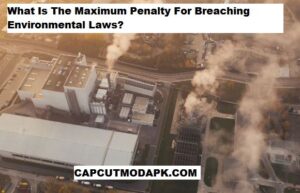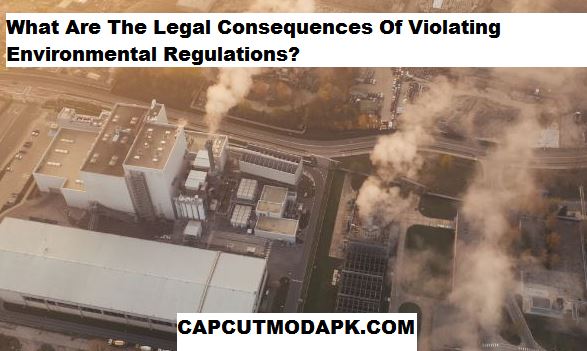Environmental regulations are put in place to safeguard the environment and ensure public health. They establish clear guidelines for how individuals, businesses, and industries must operate to minimize pollution and avoid environmental harm. However, when these laws are ignored or violated, the consequences can be severe, not just for the environment but also for the responsible parties. Whether you’re a business owner or an individual, understanding the legal consequences of violating environmental regulations is crucial.
What are the legal consequences of violating environmental regulations? Penalties for violating environmental laws can include hefty fines, legal action, and even imprisonment. For businesses, the cost of non-compliance can extend beyond fines, impacting reputation, operations, and long-term viability. The government, through agencies like the Environmental Protection Agency (EPA), has a variety of tools and legal measures at its disposal to ensure that those who break the law are held accountable.
This article will discuss the legal consequences of violating environmental regulations, including what qualifies as a violation, the penalties involved, and the broader impact of environmental mismanagement. By understanding these consequences, you can better navigate the complex world of environmental law and take the necessary steps to comply.
Also, READ
How To Comply With The Clean Air Act Or A Manufacturing Business
What Is An Environmental Law Violation?
An environmental law violation occurs when an individual or business fails to follow regulations set to protect the environment. These violations can involve a wide range of activities, from improper disposal of hazardous waste to exceeding emission limits for air pollutants. Any action that harms the environment or violates specific laws and regulations governing land, water, or air quality can be considered a violation.
The violations could range from minor offenses, like failing to file required reports, to serious offenses like illegal dumping of toxic chemicals into rivers or air pollution that exceeds regulated levels. Most environmental regulations are set by local, state, and federal governments, with the Environmental Protection Agency (EPA) playing a critical role in enforcing many of these laws.
An example of an environmental law violation could be a manufacturing plant that discharges untreated wastewater into a nearby stream, violating the Clean Water Act. Another example could be a business exceeding limits on greenhouse gas emissions set by the Clean Air Act. In both instances, the violators face legal consequences, which can vary depending on the severity of the violation.
What Happens If You Don’t Follow The Environmental Protection Act?
The Environmental Protection Act (EPA) is a key piece of legislation aimed at reducing pollution and protecting natural resources. The Act regulates various aspects of environmental health, including air, water, and land quality. Failure to comply with the provisions of the Environmental Protection Act can result in a range of consequences, depending on the nature of the violation.
One of the most common penalties for violating the Environmental Protection Act is the imposition of fines. These fines can be substantial, especially for businesses that engage in large-scale violations. For example, a company that exceeds allowable levels of air pollution could be fined for every day they remain in violation. These fines can accumulate quickly, making non-compliance a costly affair.
In some cases, criminal penalties may be applied. If the violation is deemed intentional or grossly negligent, individuals involved can face criminal charges, including imprisonment. Additionally, businesses may be required to cease operations until they meet compliance requirements, leading to costly shutdowns. Legal action, including lawsuits from affected individuals or communities, can also result from violations of the Environmental Protection Act.
What Are The Consequences Of Environmental Mismanagement?
Environmental mismanagement refers to the failure to properly manage the impact that business or industrial operations have on the environment. This can involve failing to maintain pollution control equipment, improper waste disposal, or ignoring best practices for sustainability. The consequences of environmental mismanagement can be severe, affecting both the environment and the responsible parties.
For businesses, environmental mismanagement can result in hefty fines from regulatory agencies like the EPA. These fines are often calculated based on the severity of the violation and the extent of the damage caused. A company that repeatedly fails to meet environmental standards could face escalating penalties, even being forced to close operations temporarily or permanently until they rectify their practices.
In addition to financial penalties, environmental mismanagement can lead to reputational damage. Companies found guilty of harming the environment may lose customers, face public backlash, and suffer from a loss of trust in the marketplace. The long-term impact of reputational damage can be as significant as financial penalties, especially for businesses that rely on public perception to thrive.
Environmental mismanagement also opens the door for lawsuits from individuals or groups affected by the damage. For example, communities impacted by toxic emissions or polluted water supplies may seek compensation for health problems or property damage caused by environmental neglect.
How Are Violators Of Environmental Laws Held Accountable?
Violators of environmental laws are held accountable through a combination of legal mechanisms that include administrative penalties, civil enforcement actions, and criminal prosecution. Regulatory agencies, particularly the Environmental Protection Agency (EPA), play a critical role in monitoring compliance with environmental laws and investigating potential violations.
Once a violation is identified, the EPA or relevant local or state agency typically issues a notice of violation to the offending party. This notice details the violation and outlines potential penalties. In many cases, violators are given the opportunity to correct the violation, often through negotiations that involve implementing pollution control measures or paying fines. However, in cases of willful misconduct or severe harm to the environment, the agency may move forward with civil or criminal enforcement actions.
Civil enforcement actions often involve the imposition of fines or requiring the violator to take corrective action, such as cleaning up contaminated sites or installing pollution control technology. In more severe cases, criminal prosecution can lead to criminal charges against individuals or corporate executives responsible for the violation. Criminal penalties for environmental violations can include substantial fines, restitution, and even imprisonment, depending on the severity of the offense.
In some cases, environmental laws also allow for citizens or organizations to file lawsuits against violators. This citizen suit provision can be an important tool for holding parties accountable when government agencies fail to act or when violations cause widespread harm.
What Is The Maximum Penalty For Breaching Environmental Laws?

The maximum penalty for breaching environmental laws depends on the specific law violated and the nature of the violation. Fines can vary significantly, from a few hundred dollars for minor violations to millions of dollars for serious offenses. For example, under the Clean Water Act, the maximum penalty for a violation can reach up to $50,000 per day for each day the violation continues.
Criminal penalties for breaching environmental laws are more severe. Individuals found guilty of criminal violations could face up to five years in prison, depending on the offense. In cases where an individual’s actions were intentionally harmful or grossly negligent, criminal fines can reach millions of dollars, and corporate executives can be held personally liable.
The maximum penalty for environmental law violations is intended to deter businesses and individuals from disregarding the law. The EPA also has the authority to adjust penalties based on factors like the severity of the violation, the violator’s history of compliance, and the damage caused by the offense. For businesses, these penalties can represent a significant financial burden, especially if violations lead to ongoing damage to the environment or public health.
Which Of The Following Are Possible Consequences For Business Violations Of Environmental Laws?
For businesses, violating environmental laws can lead to a variety of serious consequences. These may include:
- Fines: Businesses can face significant fines for violating environmental laws, with amounts varying depending on the type of violation.
- Shutdown Orders: Companies may be forced to halt operations until they come into compliance with environmental regulations.
- Criminal Charges: In severe cases, corporate officers or employees may face criminal prosecution, resulting in fines or imprisonment.
- Lawsuits: Affected parties, such as local communities or environmental organizations, may sue for damages caused by the violation.
- Reputational Damage: Businesses that violate environmental laws may suffer damage to their public image, losing customers and investors.
- Cleanup Costs: In cases of environmental damage, businesses may be required to cover the costs of cleaning up the affected areas.
These consequences highlight why compliance with environmental regulations is so important for businesses. The risks of non-compliance are not limited to financial penalties but can extend to long-term operational and reputational harm.
Conclusion
What are the legal consequences of violating environmental regulations? The consequences are substantial and can have serious financial, operational, and reputational impacts. Violations of environmental laws can lead to hefty fines, criminal charges, lawsuits, and long-term damage to a company’s brand. For businesses, environmental compliance is not only a legal requirement but also a critical aspect of corporate responsibility.
By understanding the potential penalties and consequences of environmental violations, companies can take proactive steps to ensure compliance and avoid costly mistakes. Adopting best practices for environmental protection not only helps businesses stay within the bounds of the law but also contributes to the long-term sustainability of the planet. Taking responsibility for environmental impact is crucial, both for legal compliance and for fostering a healthy environment for future generations.


